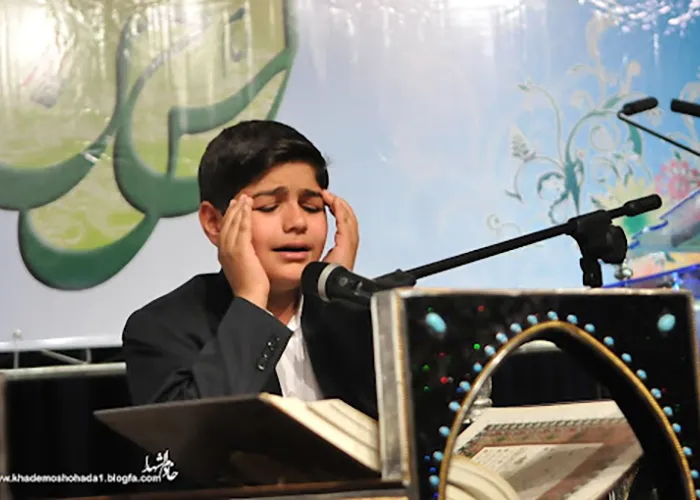Hadith Of The Week – Volume01 Issue21
Reflection on the Quranic Recitation: Understanding and Practicing True Engagement
This week, we commemorate the legacy of Allamah Seyyed Mohammad Hossein Tabatabai, the renowned author of the Al-Mizan Tafsir, one of the most profound Qur’anic exegeses in the modern era. In honour of his invaluable contributions to Islamic scholarship, particularly in fostering a deep and systematic understanding of the Qur’an, we reflect on a hadith that emphasises the importance of approaching the Qur’an with reverence, clarity, and contemplation. This narration serves as a reminder to all, from young readers to parents and educators, of the significance of connecting with the Qur’an on a thoughtful and spiritual level.
سَأَلْتُ أَبَا عَبْدِ اللَّهِ ع عَنْ قَوْلِ اللَّهِ عَزَّ وَ جَلَّ- وَ رَتِّلِ الْقُرْآنَ تَرْتِيلًا قَالَ قَالَ أَمِيرُ الْمُؤْمِنِينَ ص بَيِّنْهُ تِبْيَاناً وَ لَا تَهُذَّهُ هَذَّ الشِّعْرِ وَ لَا تَنْثُرْهُ نَثْرَ الرَّمْلِ وَ لَكِنْ أَفْزِعُوا قُلُوبَكُمُ الْقَاسِيَةَ وَ لَا يَكُنْ هَمُّ أَحَدِكُمْ آخِرَ السُّورَةِ
(Al-Kāfī, Vol. 2, p. 614)
In this profound narration, Abdullah ibn Suleiman narrates from Imam Sadiq (peace be upon him), regarding the Qur’anic command “And recite the Qur’an with measured recitation” (Quran, 73:4). Imam Sadiq (AS) reports that Imam Ali (AS), interpreted this to mean: “Explain it clearly; do not rush it as poetry is recited, nor scatter it like sand. Rather, allow it to strike fear into your hardened hearts, and do not let your sole concern be merely to finish the chapter.” This hadith carries essential educational messages for different segments of society, offering timeless guidance for spiritual engagement with the Qur’an.
Messages for Adolescents and Young Adults
- Developing Fluent and Beautiful Qur’anic Recitation Skills
For young readers, learning to recite the Qur’an fluently and beautifully is of immense value. While mastering other subjects and activities, dedicating time to Qur’anic recitation should also be a priority. A fluent recitation aids in developing a stronger bond with the Qur’an and enhances the spiritual experience. This excellence in recitation requires dedication, making Qur’anic learning sessions and classes a valuable part of one’s routine.
- Seeking Understanding of the Qur’anic Message
Young readers are encouraged not only to read but to seek a deeper understanding of the Qur’an. This can be achieved by consulting those more knowledgeable, joining study sessions, or exploring trusted tafsir (interpretation) sources. The Qur’an itself promotes reflection:
أفَلَا يَتَدَبَّرُونَ الْقُرْآنَ
“Will they not then ponder over the Qur’an?” (Quran, 4:82)
Learning from mentors and accessing Qur’anic resources fosters a deeper connection with its teachings and encourages contemplation and application in daily life.
Messages for Parents
- Prioritising Qur’anic Education for Children
A critical responsibility parents hold is to ensure that their children receive Qur’anic education, which is a spiritual right of the child. Parents should strive to introduce Qur’anic reading and understanding as part of their children’s early education, instilling in them a love and respect for the divine word. Imam Ali (AS) emphasised the duty to teach the Qur’an, saying:
اَدِّبُوا اَوْلادَكُمْ عَلى ثَلاثِ خِصالٍ: حُبِّ نَبِيِّكُمْ و حُبِّ اَهْلِ بَيْتِهِ وَ قَراءَةِ الْقُرْآنِ.
“Teach your children three things: love of your Prophet, love of his family, and reading the Qur’an.” (Bihar al-Anwar, Vol. 104, p. 95)
This includes teaching children the values and wisdom embedded in the Qur’an, making it an integral aspect of their growth and moral foundation.
- Emphasising Quality and Understanding Over Quantity
In family Qur’anic reading, parents are encouraged to emphasise quality and understanding rather than mere completion. This hadith reminds us that it is better to focus on the meaning and impact of a few verses than to hastily read through a chapter without understanding. Surah Muhammad, Verse 24 says:
أَفَلَا يَتَدَبَّرُونَ الْقُرْآنَ أَمْ عَلَى قُلُوبٍ أَقْفَالُهَا
“Do they not reflect upon the Qur’an, or are there locks upon their hearts?” (Quran, 47:24)
Parents can inspire reflection in their children by sharing the lessons in the verses, fostering a spirit of contemplation and application over rote recitation.
Messages for Islamic Centre Leaders and Cultural Organisations
- Structured Qur’anic Education Programmes
Islamic centres play a vital role in community learning and should ensure comprehensive Qur’anic education that covers basic recitation, in-depth reading, reflection, and application. A consistent structure helps participants progress from basic skills to a more profound engagement with the Qur’anic message, addressing both young learners and adults. Such programmes allow the community to engage deeply, respecting the recommendation in the hadith for focused and meaningful recitation.
- Leading by Example in Qur’anic Practice
As role models, leaders should embody Qur’anic teachings in their actions, serving as living examples of the Qur’an’s application. The Prophet Muhammad (PBUH) himself was a great example for reflecting Quranic values in his every action. When followers observe this practical adherence to the Qur’an, they gain a more profound respect and understanding of its message.
- Clarifying the Connections Between Qur’anic Verses
To avoid reading “like scattered sand,” as mentioned in the hadith, educators should highlight the interconnectedness within the Qur’an’s verses and themes. Utilizing the approach of “Qur’an by Qur’an interpretation,” such as in Allamah Tabatabai’s Al-Mizan, helps readers grasp how different verses and chapters resonate with each other. This allows them to approach the Qur’an holistically, appreciating its coherence and depth. This comprehensive, interconnected approach to reading and understanding the Quran helps uncover the truth within its teachings:
إِنَّ هَذَا الْقُرْآنَ يَهْدِي لِلَّتِي هِيَ أَقْوَمُ
“Indeed, this Qur’an guides to that which is most upright.” (Quran, 17:9)
In other words, by guiding readers to understand these connections, leaders foster a comprehensive grasp of the Qur’anic message, enhancing the spiritual experience and relevance of the Qur’an for each reader.
editor's pick
news via inbox
Subscribe to the newsletter.




